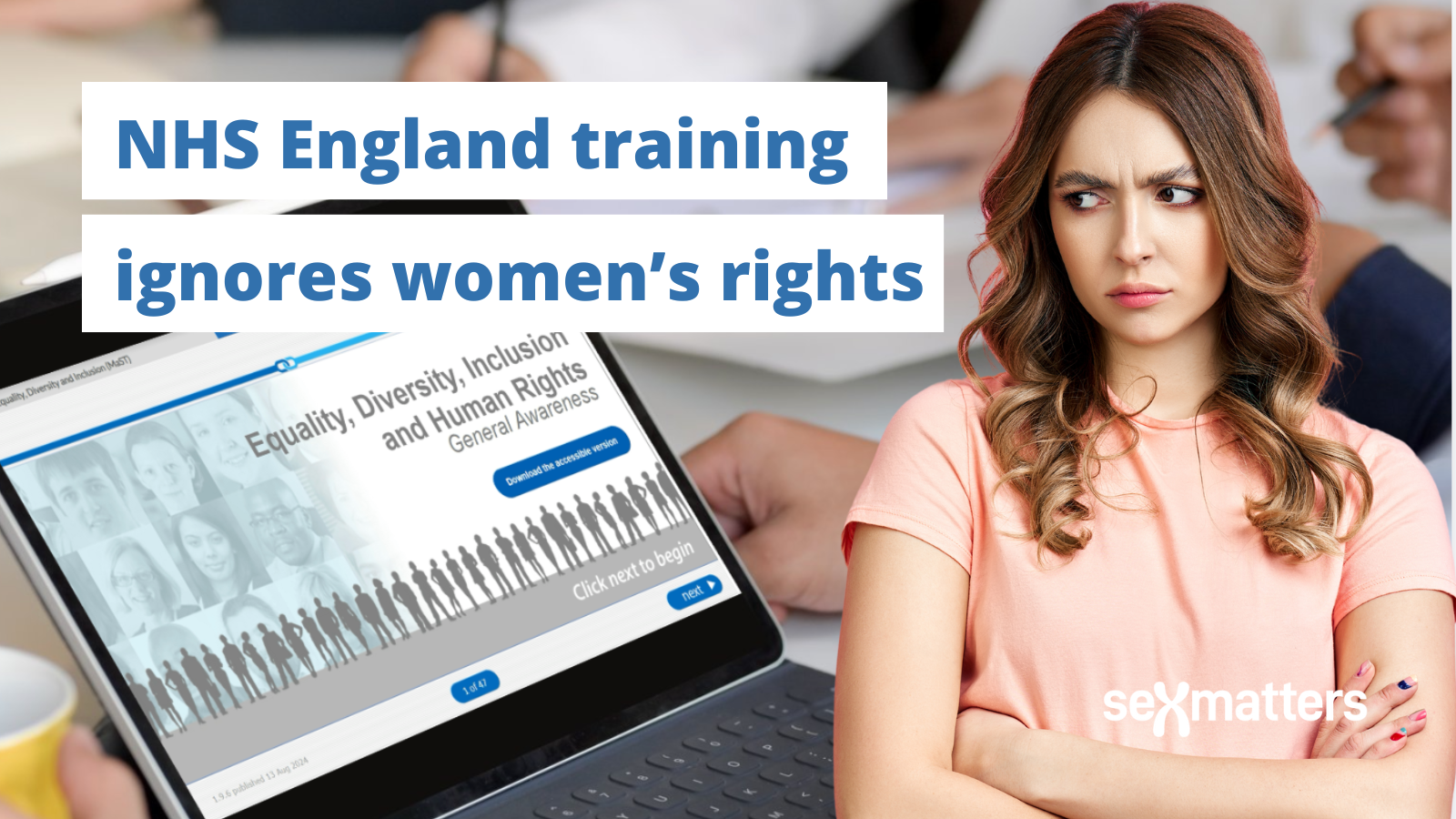NHS England training calls staff “transphobic” if they won’t share toilets with the opposite sex

Sex Matters has written to Amanda Pritchard, the chief executive of NHS England, to raise concerns about NHSE’s “mandatory and statutory” training on “Equality, Diversity, Inclusion and Human Rights Skills”. The training is required for all its 6,500 staff. It presents disagreement with extreme gender ideology as “transphobia”.
The training does not explain the Equality Act clearly, instead presenting a set of snapshots “to show that Equality & Diversity issues are not always obvious”.
It uses the term “Gender Confirmation” and says:
“The law protects people from direct and indirect discrimination and harassment if they are not the same gender as the one they were born as.”
It conflates sex and “gender identity” as “gender discrimination”:
“Gender discrimination is when someone is treated unequally or disadvantageously based on their gender but not necessarily in a sexual nature. This includes harassment of discrimination based on sex, gender identity, or gender expression.”
It presents a scenario in which a staff member who feels uncomfortable sharing toilet facilities with a member of the opposite sex is described as “transphobic”, in which says that colleagues who identify as transgender are entitled to use opposite-sex facilities:
“it is always an individual’s choice to use whichever facilities match how they identify.”
On religion or belief discrimination, it says:
“This characteristic does not include political or scientific beliefs.”
This is inaccurate. Philosophical beliefs that have a political or scientific character can be included under the protected characteristic of “religion or belief”. Gender-critical beliefs may be rooted in both science and feminist philosophy, as well as in common sense. And lack of belief that men can be women is also protected.
The whole training promotes gender ideology, saying, for example:
“If you are unsure how someone identifies, then use neutral language. Use the term a person uses to describe themselves (like ‘he’ or ‘she’ or ‘they’). Be mindful that some people don’t like pronouns being mentioned.”
“When people have changed their name as part of their gender transition, do not refer to them by their previous name – this is known as ‘deadnaming’ and can devalue their transition.”
“It is not acceptable under any circumstances to discriminate on any aspect of identity.”
In order to pass you have to ignore women’s rights
The teaching section is followed by a series of multiple-choice questions that staff members must answer “correctly” in order to pass.
You are working as part of a large project team involving members of staff from across the organisation. The project team meets on a fortnightly basis for a full day, and you have been told by the project lead that during these meetings Sharon, a 54-year-old trans employee, is not allowed to use the female bathrooms. What kind of discrimination has been displayed here?
- Age?
- Sexual Orientation?
- Gender confirmation/Reassignment ?
View the “correct” answer according to NHS England
“The correct answer is 3. Regardless of whether Sharon has completed a process to have her gender legally recognised, or even if she is under medical supervision, she is still protected by the Equality Act 2010. The action displayed to Sharon in this scenario would be seen as a violation of her dignity and the creation of a degrading and humiliating situation. Gender identity is one’s own internal sense of self and their gender, whether that is man, woman, neither or both. Unlike gender expression, gender identity is not outwardly visible to others.”
We have written to NHSE highlighting that this training puts it at risk of discriminating against staff who don’t hold gender ideology beliefs. Several ongoing legal cases relate to NHS policies permitting trans-identifying male staff to use female facilities (a group of nurses in Darlington, a nurse in Fife and a Muslim NHSE worker).
We are calling on the CEO to recall and review the training to ensure that it is in line with the law and with NHS England’s responsibilities to protect all its staff from discrimination and harassment.
- Read our letter to Amanda Pritchard
- View the NSHE training
